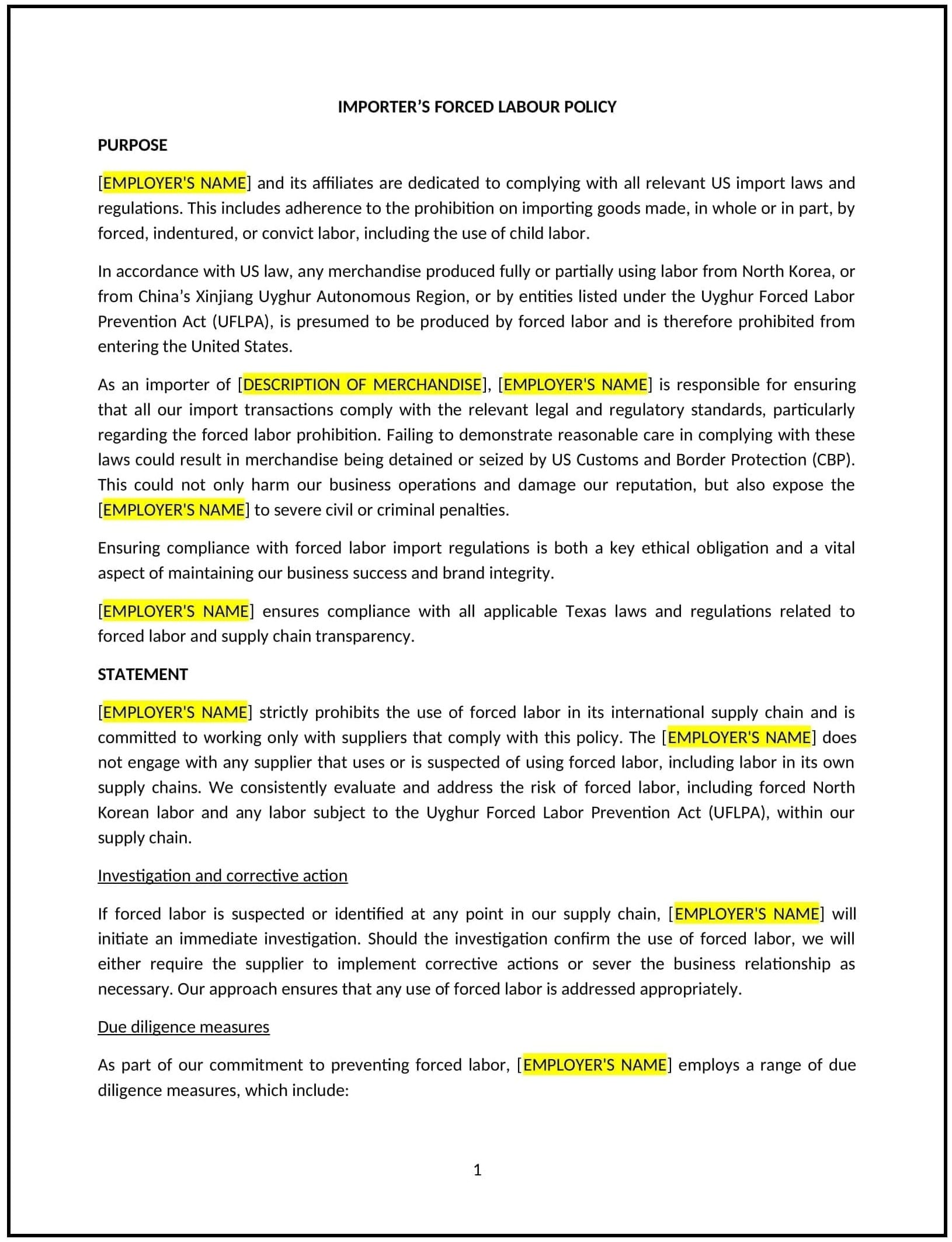Importer's forced labour policy (Texas): Free template
Got contracts to review? While you're here for policies, let Cobrief make contract review effortless—start your free review now.

Customize this template for free
Importer’s forced labour policy (Texas)
This importer's forced labour policy is designed to help Texas businesses ensure that their supply chains are free from forced labor, in compliance with the Tariff Act of 1930, the California Transparency in Supply Chains Act, and other relevant U.S. and Texas state laws. This policy outlines the steps businesses should take to prevent the use of forced labor in their operations and supply chains while promoting ethical sourcing practices.
By adopting this policy, businesses can demonstrate their commitment to ethical sourcing, avoid reputational risks, and improve compliance with anti-trafficking and anti-slavery laws.
How to use this importer's forced labour policy (Texas)
- Define forced labor: Clearly define what constitutes forced labor, including practices such as human trafficking, debt bondage, and the use of threats or coercion to force individuals to work under exploitative conditions.
- Establish due diligence procedures: Specify the steps businesses will take to ensure that forced labor is not present in their supply chains, including supplier audits, third-party assessments, and background checks on suppliers and vendors.
- Develop supplier agreements: Outline the expectations for suppliers, including the requirement to comply with anti-forced labor standards and provide transparency into their labor practices. This may include requiring suppliers to sign contracts that certify their compliance with the policy.
- Implement monitoring and audits: Set guidelines for regularly monitoring suppliers and conducting audits to ensure compliance with the policy. This may involve inspections, interviews with workers, and reviewing supplier records.
- Provide training and awareness: Offer training to employees, particularly procurement, HR, and supply chain teams, to help them recognize signs of forced labor and understand how to address potential issues in the supply chain.
- Set reporting and corrective action procedures: Establish a process for reporting suspected forced labor practices, both internally and with external organizations. Define the corrective actions that will be taken if forced labor is discovered in the supply chain, such as terminating supplier contracts or reporting violations to authorities.
Benefits of using this importer's forced labour policy (Texas)
This policy offers several benefits for Texas businesses:
- Reduces legal and reputational risk: By proactively addressing forced labor in supply chains, businesses reduce the risk of legal consequences, regulatory penalties, or reputational damage associated with human trafficking or labor exploitation.
- Promotes ethical sourcing: A clear policy helps businesses demonstrate their commitment to sourcing goods and services responsibly, ensuring that suppliers adhere to ethical labor practices.
- Enhances supplier relationships: By setting clear expectations and engaging in due diligence, businesses can build stronger relationships with suppliers who share their commitment to preventing forced labor and human trafficking.
- Attracts ethically-minded customers: Businesses that are transparent about their efforts to combat forced labor are more likely to attract customers who value ethical sourcing and corporate responsibility.
- Complies with regulations: The policy helps promote compliance with federal and Texas state laws that require businesses to take action against forced labor in their supply chains, reducing the risk of non-compliance penalties.
Tips for using this importer's forced labour policy (Texas)
- Communicate the policy clearly: Ensure that all employees, especially those in procurement, supply chain management, and HR, are aware of the importer's forced labor policy and understand their roles in preventing forced labor in the supply chain.
- Engage with suppliers: Work closely with suppliers to ensure they understand the business's commitment to anti-forced labor practices and are aware of the expectations outlined in the policy.
- Conduct regular audits: Regularly assess suppliers through audits, monitoring, and reporting to ensure compliance with the policy and identify potential risks in the supply chain.
- Offer training and support: Provide training and resources to suppliers to help them understand the importance of compliance and how to address forced labor issues.
- Review regularly: Review and update the policy periodically to reflect changes in Texas state laws, federal regulations, or industry best practices related to preventing forced labor.